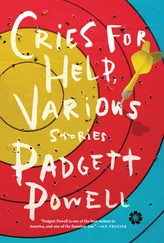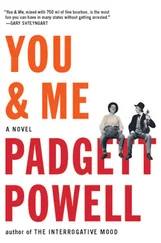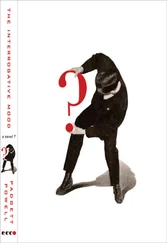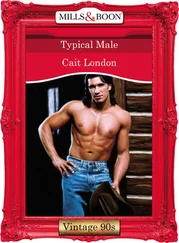“Gone give you a boom box, mother.”
From Bill’s Dollar Store, a credenza-style home entertainment center is wheeled out on a four-wheel furniture dolly by two men who struggle over curbing to keep the dolly under it.
“That thing is seven foot long,” Rooster said.
“Big enough for a boog like you,” Taint said.
“You put that affair on your shoulder and it is yours. I have had it converted to 12 volts. Batteries included.”
“Batteries?”
“Two Die Hards in the TV compartment, wired in parallel.”
“You trazee.”
“Hoist it up, Mr. Rooster.”
“This some kind of race joke.”
“Might be.”
“Hey, Rooster. So what?” the oiler said to Rooster. “So fucking what?”
“You done mess that boy up,” Rooster said to Mr. Irony.
Mr. Irony and the two Bill’s Dollar employees and the oiler got under one end of the home entertainment center and, like the Marines on the flagpole at Iwo Jima, shouldered it up to a 60-degree angle. The oiler waved impatiently at Rooster to get under the giant radio.
Rooster obliged, shaking his head, and lifted the machine without noticeable strain. He took a step backwards, kicking the dolly free, and hefted the home entertainment center an inch or two forwards and backwards for balance. He swung it, like a sail boom, through an arc, looking for the others.
“I’ll say this to his face,” the oiler said to Mr. Irony. “You are one buck nigger, Rooster.”
“You right, Daddydied. Turn this thing on.”
From the truck bed, the oiler leaned over and reached inside the long box, and suddenly the lot was overwhelmed with a booming radio broadcast. Rooster started to jive. He got clear of the truck, clear of the billboard, everyone backed off to give him room, and he began a blaster walk, a walk of total indifference to the world, a series of steps and half steps and backsteps, around the parking lot of the closed convenience store in Dillon, S.C.
He circled back by the group, now holding its ears. “Don’t want your boots now, homeboy. This all right,” he shouted. To the oiler: “Okay, Taint. Don’t call me a nigger ever again. You earn that first one.”
“Ladies,” he said, bowing slightly to the Available Traveling Women, the entertainment center tipping as slowly and heavily as a ship on a swell. “I’m going to go see some of the brothers.” He left the lot in the gliding, halting, butt-clenching locomotion required of a proper dude beneath a seven-foot-long, 200-pound, 80-watt-per-channel, fake-walnut-veneer, credenza-style home entertainment center.
Grease and oil — and that’s not all, I do hydraulic and seals and packing leathers — grease and oil is very important. It is not just, as far as a lubricant. I believe it is like the blood of machines. Not the energy — that’s your gas — but the blood, as far as life. Machine life. Saw life. Splitter life. Truck life. Backhoe life. And tools make men’s life easier. Oil is the blood of the dirt. We buried Lumpy’s Daddy Saddy. I’m okay now.
I was not for a spot there. Then we carried a fellow on the log boom thew might all Georgia that said shape up and Rooster fucked with me and I just, I don’t know, got right over it. He was, special to me, as far as almost being my own father, I thought sometimes.
My real daddy a preacher. But Lumpy daddy, before we even got married, one day he explained to me what viscosity means. That is a word I deal with. One day he give me a beer and a bowl of hot chili and he say, That — pointing to the beer — is not viscosity, and that — pointing to the chili — is viscosity. That might sound obvious to me now, but it was not obvious to me then. It was a hot chili, too. Lumpy daddy make a good chili.
I’m okay now.
Mr. Irony came to see me later that afternoon in Pampa’s and my suite — Pepe’s El Presidente Suite at South of the Border, where Duke recommends Men at Their Best recuperate from log-truck carriage — came to me and asked that I not make myself so scarce, explaining that “things” need me. I asked him what that was intended to mean. He said again: “Well, things need you, son.
I pondered this a moment, and it occurred to me that he somehow knew of my decision to remove myself from this account of our world tour — I had not informed him of that decision; nor, for that matter, was he, I thought at the time, aware that there was an account. A character in a sombrero and serape jingled on spurs into the room where we sat and announced, “The senõritas expect youse for margaritas at the Acapulco Pulquería Número Three-a.” We said okay. Mr. Irony handed him a fifty-dollar bill and he left with a flourish of his serape and a jingle of spurs.
“I was at risk as your student, I thought. The oiler guy looked like he was better raw material.”
“Pshaw. Never edge him up right. Buck him up, yes. Stop that damned whimpering, yes. But the proper attitude of self-unimportance would cast him back into the aquarium in which he died. He did resemble, as you noted, the decaying Plectostomus you found as a child that shocked you because you thought it, for weeks, merely not moving.”
“Sir, you know everything I think?”
“Stop just short of everything.”
“What don’t you know, then? You said you stop short of—”
“You have had, I believe you confessed, my Traveling Woman while we’ve been Men at Our Best?”
“Yes.”
“Well. There are certain final things, in the nature of excretions and animal noises and the quality of ardor, that I choose not to know.”
“I see. But you could.”
“I could.”
“Because you are — is omniscient a meaningful term?”
“Left field. Nothing of the kind. Happy hour!”
With that, Mr. Irony left the suite, headed for the Acapulco Pulquería Número Three-a.
Mr. Irony Renounces Irony
MR. IRONY RENOUNCED IRONY and took his place in line at Unemployment. Where once he would have found the tedium of the protracted process a delight, akin to the moves of a child’s board game, he found the desk-to-desk ordeal — and getting in the wrong line, and then getting in the right line to have it closed when he was one party from the bureaucrat serving it — officious, small-minded, forgiveless horseshit.
With a sheaf of papers so bulky that he longed for a briefcase to hold them in, he stood on one pained leg or the other lamenting his decision to quit irony. It left him uninsulated against the world, as if he had renounced drink or drugs instead. Despair came after him — with little tentacles it reached toward his balding head from the low fiberboard ceiling tiles of the Unemployment Office complex. “I rue the day I quit irony,” he remarked to the woman behind him.
“I wish I hadn’t quit Toys “R ” Us,” the woman said.
Despite himself, Mr. Irony felt a small thrill at her response. It was, with his remark … no, he was through with irony. Fourteen hours later, on their third shift of unemployment counselors, the same woman spoke to him again: “Honey, you didn’t really quit your job, did you?
At this instant Mr. Irony conceived of his Desired Vocation, still a blank line on several of his multitudinous forms. He wanted to be a circus rider, a trick rider of horses going in a circle, standing on them, flipping backwards on them, maybe flipping backwards from one to the other …
“I’m worrit about you, mister,” the woman was saying. “I don’t think you know the ropes.”
“Why not?”
“The way you stan there. You can’ stan there that way, all tired like, if you ever done this before. We ain’t begin to get no where. I’m fraid you did quit your job.”
Читать дальше












